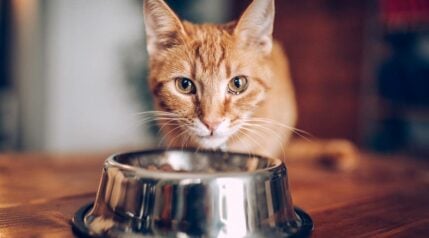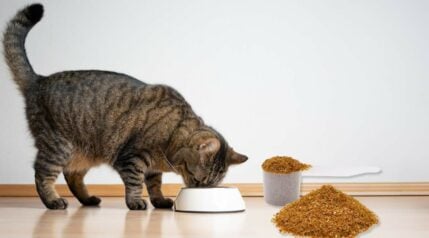When you purchase through links on our site, we may earn a commission. Here’s how it works.
In the days of cottagecore, slow living, and farmhouse aesthetic, it’s no wonder that one of the quintessential farmhouse favorites has made a comeback. Cottage cheese is an old-fashioned, fresh cheese made by fermenting milk, causing it to curdle and form into a crumbly, creamy treat.
Through the years, manufacturers have taken shortcuts to the original process, adding rennet to coagulate milk faster and heating curds at high temperatures to remove beneficial probiotics. Recent years have seen newer brands taking cues from old methods: letting milk curdle slowly for softer curds and a probiotic-rich end product. People are finding that cottage cheese tastes better than ever, and they’re eager to get all it has to offer.
Are you a cottage cheese convert and want to introduce your cat to this tasty treat? Can cats eat cottage cheese? Learn more about cottage cheese and if it’s safe for cats. We also provide a few brand recommendations if you decide to incorporate cottage cheese into your cat’s diet.
What Is Cottage Cheese?
Cottage cheese is a fresh, soft cheese consisting of curds of varying sizes. It is made from the curds of various pasteurized cow’s milk, including reduced-fat and whole milk. People enjoy cottage cheese for its mild, tangy flavor and creamy texture. It is a versatile product that can be eaten plain, paired with fruit, blended into smoothies, or baked to give a recipe a thick, smooth texture.
As with any dairy product, cottage cheese begins as milk. In cheese making, enzymes or probiotics are added to milk which converts milk sugars (lactose) into lactic acid. The lactic acid will curdle the milk, allowing the milk solids, fats, and protein to separate from the whey. The whey is then drained from the curds, leaving a solid block of cheese curds. The next step is to break the cheese into bite-sized pieces, where we get small, medium, or large curds. Finally, the curds are mixed with cream to create the finished cottage cheese product.
Although the origins of cottage cheese are unclear, we know “cottage cheese” became a popular term used to describe homemade cheese in America in the 19th century. Cottage cheese became an easy way to reduce food waste in butter making. Traditionally, people served cottage cheese with bread and crackers.
Today, cottage cheese is popular as a source of protein. It has become popular among dieters for its relatively low-calorie content. Bodybuilders like cottage cheese as a source of casein protein. In a study published in Medicine and Science in Sports and Exercise, athletes who consumed casein 30 minutes before bed experienced an uptick in muscle protein synthesis during sleep, supporting post-exercise overnight recovery.
This soft, white cheese is available in different curd sizes and milk fat levels. You can find cottage cheese whipped, lactose-free, sodium-free, with probiotics, nonfat, reduced-fat, dry curd, or standard. The United States Department of Agriculture (USDA) says consumers may store cottage cheese in the refrigerator for up to one week.
Health Benefits Of Cottage Cheese
The USDA’s FoodData Central says one cup, or 226 grams, of low-fat (1% milk fat) cottage cheese provides the following nutrients:
- Calories: 163
- Protein: 28 g
- Carbs: 6 g
- Fat: 2.3 g
This food is also high in sodium, phosphorus, calcium, selenium, riboflavin, and vitamin B12. Cottage cheese can offer the following health benefits:
- Bone Health: Cottage cheese is a quality source of calcium and phosphorus for bone health.
- Gut Support: While not all cottage cheese contains active cultures, some products contain probiotics that support digestive health and the immune system. Look for brands that clearly label their products as containing probiotics.
- Muscle Repair: The casein protein found in cottage cheese is slow digesting and can fuel your cells over extended periods, helping reduce muscle breakdown. Data shows that casein is an effective tool for increasing muscle mass and strength gains.
- Weight Support: High protein intake, like casein, can help increase the feeling of fullness. A 2020 study published in the Journal of Obesity and Metabolic Syndrome showed that a feeling of fullness can lead to reduced calorie intake and reduced body weight.
Can Cats Eat Cottage Cheese?
Cats are obligate carnivores that have digestive systems specifically adapted to eating meat. The American Society for the Prevention of Cruelty to Animals (ASCPA) emphasizes that most adult cats are lactose intolerant and can’t digest milk and other dairy products. Cats lack the necessary digestive enzymes to break down lactose, a sugar in dairy products like cottage cheese, leading to gastrointestinal issues like abdominal pain, upset stomach, vomiting, diarrhea, and more.
Can cats eat cottage cheese? It depends. Most adult cats can’t stomach dairy products, but your cat may be able to handle a teaspoon or two of cottage cheese without experiencing digestive troubles.
Is Cottage Cheese Safe For Cats?
We do not recommend feeding cottage cheese to a cat with a dairy intolerance. If you find that your cat loves cottage cheese and experiences no adverse side effects, it’s safe to feed your cat cottage cheese in moderation.
When purchasing cottage cheese, look for a product from a reputable organic farm. Check the ingredient list; the fewer ingredients, the better. Look for the USDA Organic certification and the NON-GMO Project verification.
How Do I Feed My Cat Cottage Cheese?
Start by feeding your cat one to two teaspoons of cottage cheese. Give your kitty this treat by the spoonful or add it to their food dish or lick mat. Remember that this is a treat for your cat and shouldn’t be a staple food in your feline’s diet. Here are some of our cottage cheese picks:
Kalona SuperNatural

- Ingredients: organic nonfat milk, organic whole milk, organic cream, Celtic Sea Salt, live and active cultures (mucor miehei protease)
- Use grass-fed cows on small, family farms
- USDA Certified Organic
- Use regenerative farming methods
Kalona SuperNatural makes its products from grass-fed, pasture-grazed cows. Kalona uses low-temperature pasteurization to destroy harmful pathogens but allows beneficial bacteria to survive. Certified USDA Organic dairy means that the cows have not been given any hormones. Farmers feed cows food grown without synthetic pesticides, and cows must receive 30 percent of their nutrition from grazing. Cows graze for at least 120 days of the year.
Nancy's

- Ingredients: organic nonfat milk, organic cream, salt, 4 strains of lactic cultures, live probiotic cultures (L. acidophilus, Bifidobacterium lactis)
- Milk supplied from small family farms
- USDA Certified Organic, Non-GMO Project Verified, and Kosher
- Promise billions of live probiotics per container for immune and gut health
Nancy’s cottage cheese uses two of the most-researched strains of probiotic cultures: L. acidophilus and Bifidobacterium lactis. Nancy’s farmers pledge to never use artificial growth hormone rBGH/rBST. Its cottage cheese is free of herbicides, pesticides, and antibiotics.
Good Culture

- Ingredients: organic skim milk, organic whole milk, organic cream, sea salt, live and active cultures
- Made using pasture-raised cows
- USDA Certified Organic
- Also available in flavored varieties like pineapple and strawberry chia for you
Like the other brands on this list, Good Culture uses milk from cows not treated with rBST. They sell both low-fat and whole-milk cottage cheese. We recommend the low-fat option for your feline.
Alternatives To Cottage Cheese
If you want to feed your cat cheese, try hard cheeses like cheddar and Swiss, which contain lower amounts of lactose than cottage cheese.
Frequently Asked Questions
Do Cats Like Cottage Cheese?
Cats are all different. One cat may enjoy the taste of cottage cheese, while another will turn up their nose at it. Cheese and dairy are not the best options for cats, so don’t push the subject if your feline shows no interest in cottage cheese. There are plenty of other human foods that cats can eat.
Is Cheese Bad For Cats?
Cheese is lower in lactose than other dairy products and can be used as an occasional treat or high-reward training tool; however, if your cat is sensitive to dairy, cheese should be avoided. Overall, cheese provides little nutritional value for cats, and if your cat is sensitive to lactose, consuming cheese can trigger an inflammatory immune response.
Can Kittens Eat Cottage Cheese?
No, kittens should not eat cottage cheese. Kittens have strict nutritional requirements for proper development and growth. Avoid feeding your kitten cottage cheese to prevent future digestive problems. While kittens produce more lactase enzyme to break down mom’s milk, by six months, most kittens have adult lactase levels.
Final Thoughts
Can cats eat cottage cheese? Cats are lactose intolerant and aren’t meant to digest dairy products like cottage cheese. Your cat would get more nutritional benefits from a thoughtfully made cat treat or recipe. If you are curious about quality cat food companies, check out our articles on Orijen, Acana, and The Honest Kitchen cat foods.





